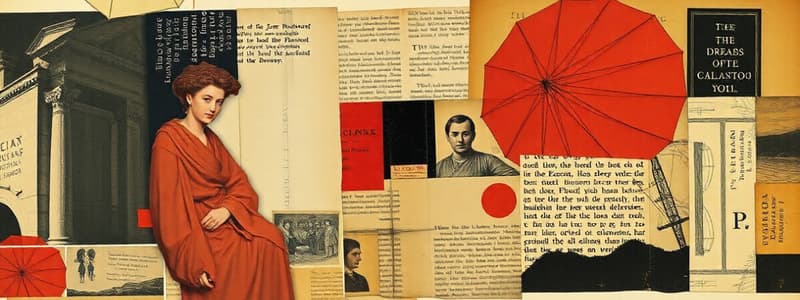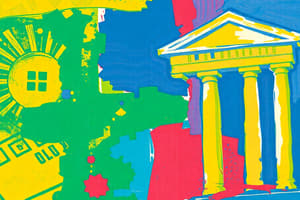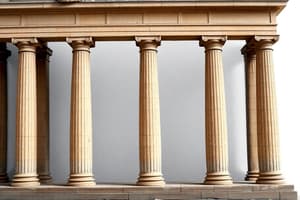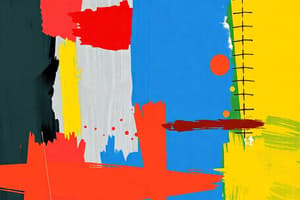Podcast
Questions and Answers
When did formal Latin literature begin?
When did formal Latin literature begin?
- 222 BC
- 272 BC
- 100 BC
- 240 BC (correct)
In what language were the first comedies and tragedies performed in Rome adapted from?
In what language were the first comedies and tragedies performed in Rome adapted from?
- Etruscan
- Egyptian
- Greek (correct)
- Spanish
Who is credited with translating Homer's Odyssey into Latin?
Who is credited with translating Homer's Odyssey into Latin?
- Quintus Ennius
- Livius Andronicus (correct)
- Gnaeus Naevius
- Horace
What verse form did Livius Andronicus use to translate Homer's Odyssey into Latin?
What verse form did Livius Andronicus use to translate Homer's Odyssey into Latin?
What type of drama is based on Roman myths and history?
What type of drama is based on Roman myths and history?
Which of these writers is considered a writer of Latin literature?
Which of these writers is considered a writer of Latin literature?
What was the lingua franca of Western and Central Europe throughout the Middle Ages?
What was the lingua franca of Western and Central Europe throughout the Middle Ages?
Which of the following periods is part of the classical era of Latin literature?
Which of the following periods is part of the classical era of Latin literature?
Who expanded on fabula palliata by producing fabula praetexta?
Who expanded on fabula palliata by producing fabula praetexta?
When did Gnaeus Naevius start producing fabula praetexta?
When did Gnaeus Naevius start producing fabula praetexta?
Flashcards
Latin Literature
Latin Literature
Written works including essays, histories, poems, and plays, composed in the Latin language.
240 BC
240 BC
The period when formal Latin literature began, marked by stage plays performed in Rome.
Latin Literature authors
Latin Literature authors
Roman authors such as Cicero, Virgil, Ovid and Horace, but also includes the work of European writers after the fall of the Empire
Livius Andronicus
Livius Andronicus
Signup and view all the flashcards
Gnaeus Naevius
Gnaeus Naevius
Signup and view all the flashcards
Fabula Palliata
Fabula Palliata
Signup and view all the flashcards
Fabula Praetexta
Fabula Praetexta
Signup and view all the flashcards
Study Notes
- Latin literature encompasses essays, histories, poems, plays, and various writings in Latin.
- Formal Latin literature began in 240 BC with the first Latin stage play in Rome.
- Latin literature thrived for six centuries, undergoing divisions of Early Latin literature, The Golden Age, The Imperial Period and Late Antiquity.
- Latin served as the language of ancient Romans and was the lingua franca of Western and Central Europe during the Middle Ages.
- Notable Roman authors in Latin literature include Cicero, Virgil, Ovid, and Horace.
- Later European writers who contributed to Latin literature include Aquinas, Francis Bacon, Baruch Spinoza, and Isaac Newton.
Early Latin Literature
- Formal Latin literature emerged with comedies and tragedies performed in Rome starting in 240 BC.
- The initial dramatic works were adaptations of Greek dramas by Livius Andronicus.
- Livius Andronicus, a Greek prisoner of war brought to Rome in 272 BC, translated Homer's Odyssey into Latin using Saturnian meter.
- Gnaeus Naevius, a Roman citizen, produced reworked Greek dramas (fabula palliata) starting in 235 BC.
- Naevius also pioneered fabula praetexta, tragedies based on Roman myths and history, beginning in 222 BC.
- Later, Naevius composed an epic poem in Saturnian meter about the First Punic War, in which he participated.
- Other epic poets followed Naevius in contributing to Latin literature.
- Quintus Ennius wrote an important historical epic.
Studying That Suits You
Use AI to generate personalized quizzes and flashcards to suit your learning preferences.





